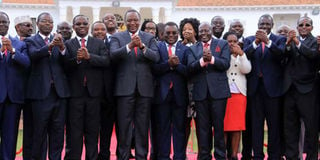Breaking News: At least 10 feared to have drowned in Makueni river
Jubilee Alliance won’t turn Kenya into one-party state

President Uhuru Kenyatta (front, third from left), Deputy President William Ruto (front, second from right) at State House in Nairobi on August 9, 2016 with officials of parties that will merge to form the Jubilee Party. Internal fights between TNA and URP over the new list of officials threatens to snip away the momentum gained by the newly-formed Jubilee Party. PHOTO | JEFF ANGOTE | NATION MEDIA GROUP
What you need to know:
To unite Kenyans, Jubilee Alliance must identify negative ethnicity as one foe that it must defeat along with poverty, bad leadership, bad systems, corruption, and intellectual poverty.
To make it attractive, the party must put interests of all Kenyans and communities above those of its leaders, who must commit themselves to taking Kenya to the next level of development.
The Jubilee Alliance is not illegal and unconstitutional, and neither does it undermine multi-party democracy, as some people, including Mr Raila Odinga, Mr Musalia Mudavadi, and Dr Eseli Simiyu, have claimed.
When this party will finally be in place, it will not be the only one as there is no law forbidding formation of another party by any Kenyan. The claim that the formation of the Jubilee Alliance brings back the era of one-party politics is, therefore, unfounded unless all other parties and coalitions dissolve themselves and join it.
From history, we know that to make Kenya a one-party state, multi-party democracy must be abolished by a constitutional amendment, as when in 1982 Kanu and Parliament inserted Section 2A that outlawed any other political party. The creation of Jubilee Alliance does not mean the abolition of all the other parties.
In politics, bigger parties are always in a better position to capture power, the ultimate aim of every politician. Big parties, therefore, always seek alliances with the smaller ones in order to enhance their chances of capturing State power. Done legally and constitutionally, political mergers are hardly so insidious as to be loathed, avoided, and criminalised.
Though most people prefer alliances that do not lead to the dissolution of their constituent members, if they are freely made, they are not undemocratic. In the older democracies of Europe, parties form alliances with smaller ones if they do not get enough parliamentary seats to form a government on their own.
PEACEFUL MEANS
As war has been defined as politics by other means, politics has been defined as war using peaceful means. Like in war, political parties, therefore, enter into competition with others in mergers whose war formations get better the bigger they are.
As in ordinary life, people are free to marry and divorce and in politics parties should also be free to merge and break up when they can no longer work together.
However, there are instances when a merger can threaten multi-party democracy. If forming another party outside the merger is forbidden by law, as was the case in Kenya after Section 2A was introduced in the Constitution, then that is a real threat.
The opposition Cord is an alliance of several parties that want to retain their identity. The existence of Cord is guarantee enough against the return of the one-party era.
However, for the Jubilee Alliance to achieve unity among Kenyans, as it has stated, it must adopt nationalism rather than ethnicity and ethnic interests as its ideology. In other words, to unite people, the Jubilee merger should deal with its members more as Kenyans than as ethnic communities.
To serve the country well and eradicate negative ethnicity, mergers should never be ethnic alliances. They should bring together political leaders and entities that define themselves as Kenyans, not ethnic communities and parties.
Equally, mergers should not promise jobs and resources to ethnic communities. Mergers should promise jobs and resources to all Kenyans and communities, including those who do not belong to their alliances.
President Uhuru has said that the ultimate goal of the Jubilee Alliance is to unite Kenyans by treating and serving all Kenyans equally.
To unite Kenyans, the party must identify negative ethnicity as one foe that it must defeat along with poverty, bad leadership, bad systems, corruption, and intellectual poverty.
To make it attractive, the Jubilee Alliance must put the interests of all Kenyans and communities above those of its leaders, who must commit themselves to taking Kenya to the next level of development.
Koigi wa Wamwere is a former Member of Parliament for Nakuru North (now Subukia); [email protected].





